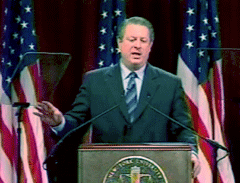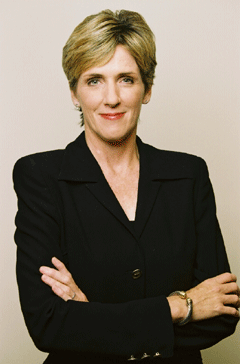Reducing CO2 From the Top Down
Air Date: Week of September 22, 2006

Former Vice-President Al Gore spoke on climate change at New York University. (Credit: New York University)
The second annual Clinton Global Initiative brought together world business and political leaders and asked them for a commitment to take action to stop global warming. Living on Earth talks with Carol Browner, head of the EPA under the Clinton administration, and a member of the Initiative’s energy and climate change advisory board.
Transcript
GELLERMAN: It’s Living on Earth. I’m Bruce Gellerman.
Al Gore insists he’s not running for president, but he’s been campaigning for the environment lately, and he’s had sharp words for the Bush administration. In a speech he gave at NYU Law School Gore warned that we’re running out of time to save the planet from global warming.
GORE: Well, first of all, I think we should start by immediately freezing CO2 emissions, and then beginning sharp reductions. Merely engaging in high-minded debates about theoretical future reductions while continuing to steadily increase emissions represents a self-delusional and reckless approach. In some ways, that approach is worse than doing nothing at all, because it lulls the gullible into thinking that something is actually being done, when in fact it is not.
GELLERMAN: Gore’s former boss was also campaigning for the environment this past week. Bill Clinton hosted the second Clinton Global Initiative. The annual conference is a gathering of some of the world’s most powerful thinkers and politicians brought together to solve the world’s toughest problems and raise money to do the job.
Carol Browner is a member of the Initiative’s Energy and Climate Change advisory board.
She was the head of the U.S. Environmental Protection Agency in the Clinton Administration. We called her at her office in Washington. Ms. Browner, thanks for joining us.
BROWNER: Well, thank you.

Carol Browner is on the Energy and Climate Change advisory board of the Clinton Global Initiative, and she’s also former head of the Environmental Protection Agency. (Courtesy of: The Albright Group)
GELLERMAN: Well, you heard the criticism by Al Gore. He said enough with talking, we’ve got to do something.
BROWNER: Well, precisely and I think when it comes to climate change we’ve been talking for over 20 years now and it’s time to get on with doing things. And part of, a number of the commitments at this conference speak directly to the issue of climate change. Whether it’s how to get boards of directors at multinationals to accept responsibility, renewable energy, looking at both electricity and fuels, very very far reaching ideas.
GELLERMAN: This is a who’s who of the world’s scientists, Nobel Prize winners, presidents, prime ministers, queens, kings. Do you think they’ll sign on to what Gore’s calling an immediate freeze on CO2?
BROWNER: Well, I think some will sign on to that. I think – equally important – some will make commitments within their companies to switch fuel to look for alternatives to invest money into getting about the business of actually reducing their greenhouse gases, of reducing the footprint, the impact that they’re having on the world environment and the health of the environment and the health of the world’s citizens.
GELLERMAN: I know this is a bipartisan meeting, the Clinton Global Initiative but is there any way you can avoid politics?
BROWNER: Well, I think in some ways this is outside of politics. It is absolutely bipartisan. But as important as that is, it’s finding ways to work together that perhaps haven’t been explored before, or wouldn’t be explored, but for putting people in the same room.
GELLERMAN: Will we really be able to measure the effect of this conference? I mean next year at this time if I were to talk to you, you’d say we were successful and here’s how.
BROWNER: Well, you take the commitment. And if the commitment is made to reduce someone’s carbon impact by 20 percent, you can go out and measure that. If a commitment was made to work with 20 or 30 boards of directors, go out and find out what happened. Did you educate those people? That’s the first step. But more importantly did those boards of directors of multinationals make a decision to change how their company was doing business.
GELLERMAN: Well, what do you feel the Bush administration should be doing to address climate change?
BROWNER: Well, obviously this has been a passion of mine for many years. And I’m disappointed this administration has not taken on the lead. I think the single most important thing we can do now is call on Congress to set a cap, a national cap on greenhouse gas emissions. And lets get working within the economy to find the common sense cost-effective ways to go about reducing our carbon impact.
GELLERMAN: One of the reasons the Bush administration has been against reducing carbon dioxide emissions is because he says we can’t afford it.
BROWNER: Well, we’ve heard that argument time and time again when it comes to protecting our environment, our air our water: that somehow or another we have to choose between a healthy environment and a healthy economy. We don’t have to make that choice. We proved that during the eight years of the Clinton-Gore administration. Certainly there would be changes. I’m not saying that this would be without impacts. But the idea that it’s all negative is simply not the case. At this conference we have lots of people who are making investments they believe there is going to be a return on those investments. Investments that will reduce greenhouse gases, that will reduce carbon emissions.
GELLERMAN: Well, Ms. Browner, thank you very much.
BROWNER: Thank you.
GELLERMAN: Carol Browner is on the energy and climate change advisory board of the Clinton Global Initiative. She was head of the EPA during the Clinton administration.
Links
Living on Earth wants to hear from you!
Living on Earth
62 Calef Highway, Suite 212
Lee, NH 03861
Telephone: 617-287-4121
E-mail: comments@loe.org
Newsletter [Click here]
Donate to Living on Earth!
Living on Earth is an independent media program and relies entirely on contributions from listeners and institutions supporting public service. Please donate now to preserve an independent environmental voice.
NewsletterLiving on Earth offers a weekly delivery of the show's rundown to your mailbox. Sign up for our newsletter today!
 Sailors For The Sea: Be the change you want to sea.
Sailors For The Sea: Be the change you want to sea.
 The Grantham Foundation for the Protection of the Environment: Committed to protecting and improving the health of the global environment.
The Grantham Foundation for the Protection of the Environment: Committed to protecting and improving the health of the global environment.
 Contribute to Living on Earth and receive, as our gift to you, an archival print of one of Mark Seth Lender's extraordinary wildlife photographs. Follow the link to see Mark's current collection of photographs.
Contribute to Living on Earth and receive, as our gift to you, an archival print of one of Mark Seth Lender's extraordinary wildlife photographs. Follow the link to see Mark's current collection of photographs.
 Buy a signed copy of Mark Seth Lender's book Smeagull the Seagull & support Living on Earth
Buy a signed copy of Mark Seth Lender's book Smeagull the Seagull & support Living on Earth

